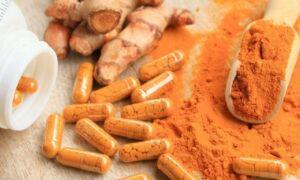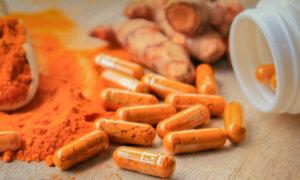Turmeric, or Curcuma longa, is a ubiquitous spice with antioxidant properties that can help promote weight loss and have an anti-COVID effect. However, turmeric is not suitable for everyone, and cases of liver injury caused by turmeric have increased in the United States in recent years.
Certain symptoms occurring after taking turmeric may be a sign of liver injury, according to Dr. Lee Jia-Ling, director of Taiwan Fu-Chin Chinese Medicine Clinic and a dual-certified aromatherapist by the National Association for Holistic Aromatherapy (NAHA) and International Federation of Aromatherapists (IFA).
Curcumin, the active ingredient in turmeric, is a polyphenol with various health benefits, including anti-inflammatory and anti-tumor effects. Polyphenols are antioxidant compounds and essential nutrients.
According to Dr. Lee, turmeric is mainly used in treating obesity-related diseases, such as nonalcoholic fatty liver disease, polycystic ovary syndrome, high cholesterol, and low-density cholesterol (“bad” cholesterol). Turmeric is also effective in improving some of the symptoms of rheumatoid arthritis, protecting the heart, and improving indigestion.
Turmeric-Related Liver Injury
The American Journal of Medicine published a study in October 2022 on 10 turmeric-related liver injury cases between 2011 and 2022 in the United States. The study indicated that, as turmeric products have become more prevalent in recent years, the number of patients with turmeric-induced liver injury appears to have increased, with six cases occurring after 2017. One patient also died of acute liver failure.Of the 10 patients, three used a turmeric product with black pepper. The combination of these could potentiate liver injury, as “only 20 mg of piperine taken with turmeric is reported to increase its bioavailability 20-fold in serum,” the study said.
Why Turmeric Can Hurt the Liver
Since the start of the pandemic, curcumin’s anti-COVID effect has attracted the attention of the medical circle. A clinical study published in Nutrients in January 2022 found that supplementation with curcumin in patients with mild and severe COVID-19 could effectively improve symptoms such as coughing, dyspnea, and muscle soreness. It also maintained patients’ blood oxygen levels.
However, Dr. Lee noticed that during the pandemic, there were often patients who felt unwell after eating turmeric. Some patients thought eating turmeric could improve brain fog symptoms, and some thought extreme flavors like turmeric could stimulate their impaired senses of smell and taste due to COVID-19.
From the Chinese medical perspective, this is “hazardous behavior,” said Dr. Lee.
Traditional Chinese medicine (TCM) classifies food and treatment according to their different inherent properties—for example, cold, hot, warm, and calm; and sour, sweet, bitter, spicy, and salty. Additionally, the energy of food and medicine corresponds to the body’s internal organs.
Different kinds of food will nourish people with varying body types.
According to Dr. Lee, turmeric is warm, spicy, and bitter in nature and enters the liver and spleen meridians, the energy channels for the liver and spleen.
10 Symptoms of Turmeric Overdose
In TCM, the energy meridians circulate between the internal organs and the body’s surface.The liver meridian travels from the big toe up the inside of the leg, along the groin to the genitourinary system in the lower abdomen, from the ribs to the liver, the lungs to the breast, up to the thyroid gland, and then to the eyes, and finally, to the top of the head.
- Burning pain on the inner legs.
- Distention and pain in the groin and abdomen.
- Yellowish vaginal discharge in women.
- Pain in the right side of the ribs.
- Breast pain and swelling.
- Cough and chest tightness.
- Inflammation of the thyroid gland.
- Red, swollen, or hot eyes.
- Headaches.
- Moodiness and irritability.
After further questioning, she learned they had a habit of eating turmeric. Dr. Lee told these patients to stop eating turmeric and prescribed medication to dissipate their liver heat, which soon alleviated their symptoms.
Dr. Lee explained that many think turmeric has anti-inflammatory effects, which in TCM would translate to “heat-clearing.” These are two different concepts, however, and overeating turmeric will only aggravate liver heat.
Dr. Lee emphasized that pain in the upper right abdomen, fatigue, and dark urine are signs of liver damage and should be treated immediately. If the liver continues to be inflamed, permanent damage may occur.
When selecting turmeric health products, Dr. Lee said that the main thing is to avoid taking them long-term and consult a TCM doctor to see if turmeric suits your body type.
She pointed out that if you have intense liver fire, you can take Curcuma aromatica, another herb from the turmeric family. The effects of Curcuma aromatica and turmeric are similar; both can promote fat metabolism and treat symptoms related to the liver meridian.
The distinction between the two is that Curcuma aromatica is “cold” and is suitable for people with a “hot” body constitution. At the same time, turmeric is “hot” and is ideal for people with a “cold” constitution.
Furthermore, people with a cold constitution would have headache symptoms aggravated by cold winds. For these people, eating turmeric is favorable. In contrast, a “hot” body has symptoms aggravated by heat conditions; Curcuma aromatica is better for these people.
Turmeric Essential Oil Therapy
The warm nature of turmeric is also conducive to essential oil therapy.Dr. Lee recommended an essential oil formula for autumn.
- 2 drops rose (or lemon) essential oil
- 2 drops Lavandula angustifolia (or Roman camomile)
- 2 drops turmeric
- 10 milliliters carrier oil






